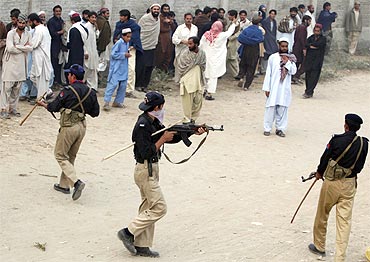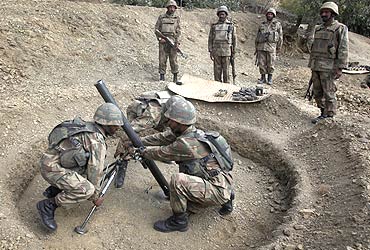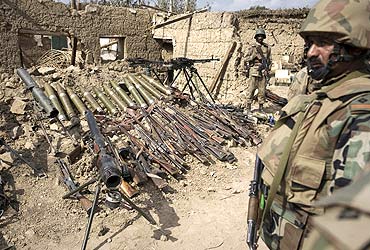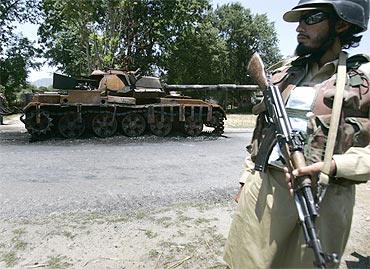Photographs: Akhtar Soomro/Reuters
Shedding its India-centric phobia, Pakistan's main spy agency Inter-Services-Intelligence has in its new threat assessment determined that Islamist militants, and not India pose the main threat to Pakistan.
In a recent internal assessment of security, the Inter-Services Intelligence, Pakistan's most powerful military spy service has determined for the first time in 63 years that it expects a majority of threats to come from Islamist militants, Wall Street Journal reported quoting a senior ISI officer.
The assessment, WSJ said, a regular review of national security allocated a two-thirds likelihood of a major threat to Pakistan coming from militants rather from India or elsewhere. "It's earth shattering. That's a remarkable change," Bruce Hoffman, a counter terrorism specialist and professor at Georgetown University was quoted as saying.
"It's yet another ratcheting up of the Pakistanis' recognition of not only their own internal problems but cooperation in the war on terrorism," he said.
'The report's impact remains to be seen'
Image: -Pakistani soldiers prepare to fire mortars towards Taliban militant positions in South WaziristanPhotographs: Faisal Mahmood/Reuters
The paper said it was unclear whether the assessment of the ISI, largely staffed by active military officers, was fully endorsed by Pakistan's military and civilian government. "The report's impact on troop positioning and Pakistan's war against militants remains to be seen," the daily said.
The assessment reflects the thinking in the mainstream of the ISI, The Wall Street Journal said. "But US officials worry that elements of Pakistan's military establishment, which they say includes retired ISI officers, continue to lend support to militants that shelter in Pakistan's tribal regions, an effort these people say is aimed at building influence in Afghanistan once the US pulls out," it said.
The paper quoted Major General Athar Abbas, the chief Pakistan military spokesman, as saying he hadn't seen the ISI report. He said India remained a threat but confirmed that it is the ISI's role to draw up security assessments, the daily said.
This could push Pak to act against the terrorists
Image: Pakistani soldiers stand next to weapons and ammunition (L) recovered during military operations against Taliban militants in South WaziristanPhotographs: Nicolas Asfouri/Reuters
While the jostling for influence in Afghanistan between India and Pakistan isn't likely to diminish, WSJ said, the ISI assessment could push Islamabad into taking stronger action against Pakistani and Afghani militants operating from its porous mountainous travel region.
The paper claimed that US has been playing behind-the- scene role to dial down tensions between the two nations as Washington wants Pakistan to redeploy more troops from its eastern frontier with India and send them to Pakistan's western border region. Pakistan has 350,000 troops on its eastern border with India. It has 150,000 troops on its western border fighting the militants. The US believes that deterioration in Indo-Pak ties could lead to a troop build up along the Indo-Pak border which will affect operations against militants in the country's north and west.
Pakistan's downgrading of its threat perception of India could help restart the stalled peace process and talks between the two countries. The assessment could help change Pakistan's perception that India is seeking influence in Afghanistan to encircle Pakistan. The assessment could also push Pakistan to act against Pakistani and Afghani militants who operate along the porous mountainous border between the two countries.
Pak must combat domestic terrorists, says US
Image: A Pakistani soldier stands guard next to an army tank destroyed by militants in Buner districtPhotographs: Akhtar Soomro/Reuters
The significance of the assessment will be based on which terror groups it classifies as a threat. The Pak army's crackdown on the Taliban and the Al-Qaeda over the last 2 years has come at a heavy cost, more that 2000 soldiers have died in the offensive against the Taliban. The ISI assessment is in stark contrast to the perception of the common people who overwhelmingly regard India as the main threat to Pakistan. Pakistan accuses India of stealing water from shared rivers and funding an insurgency in Balochistan.
Michele Flournoy, under secretary of defense for policy, said "We must continue to reassure Pakistan that as it combats the threats posed by its domestic terrorists, it is not exposing itself to increased risk along its eastern border."





article